EMPOWER ELIZABETH IN THE BIBLE
Elizabeth, the mother of John the Baptist, is a pivotal figure in the New Testament, known for her deep faith and miraculous conception despite her old age. Married to Zechariah, she was righteous and obedient to God, enduring years of barrenness before receiving divine news of her pregnancy through an angelic message (Luke 1:13).
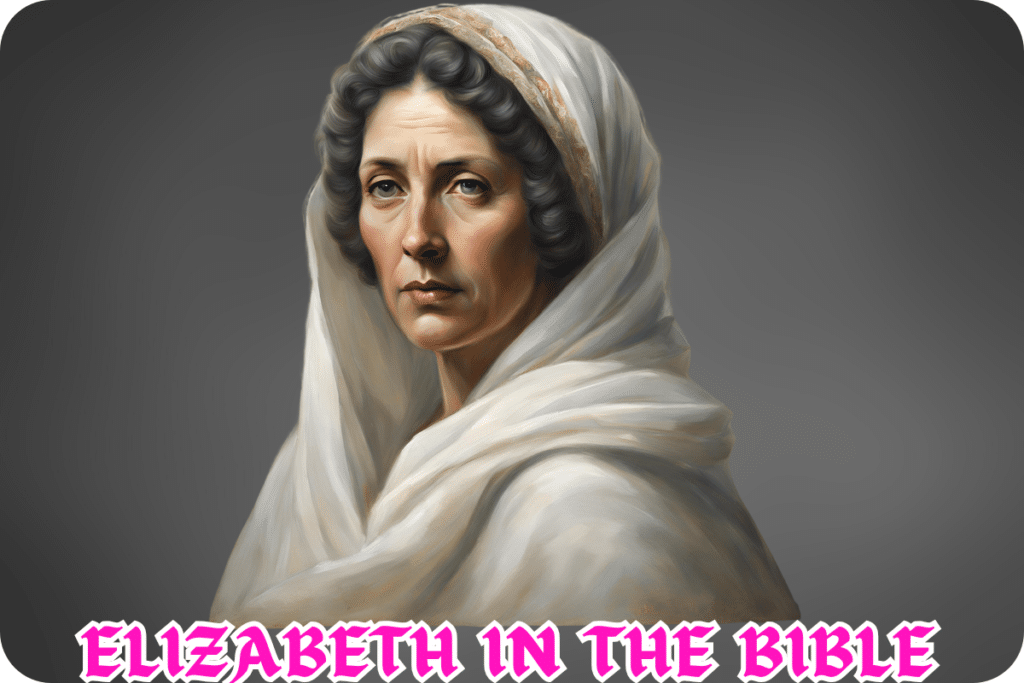
Her relationship with Mary, the mother of Jesus, is significant; when Mary visited her, Elizabeth’s unborn child leaped in recognition of Jesus, showcasing their unique spiritual connection (Luke 1:41) . Elizabeth’s story emphasizes themes of faith, divine promise, and the transformative power of God, leaving a lasting legacy for believers about trusting in divine plans even in seemingly impossible circumstances.
Who Was Elizabeth in the Bible?
Family Background and Lineage
Elizabeth, a descendant of Aaron, held a significant position in Jewish tradition. Her lineage underscores her importance, as Aaron was the first high priest of Israel. Married to Zechariah, a priest from the division of Abijah, their union exemplified a deep devotion to God and adherence to His laws.
Both were described as righteous and blameless, faithfully following God’s commandments (Luke 1:6). Their familial and spiritual heritage positioned them to raise John the Baptist, a pivotal figure in the New Testament, emphasizing their integral role in God’s redemptive plan.
Marriage to Zechariah
Elizabeth and Zechariah are depicted in the Gospel of Luke as a righteous couple, living blamelessly according to God’s commandments (Luke 1:6). Despite their devotion, they faced the societal stigma of childlessness, often viewed as a source of shame in their culture.
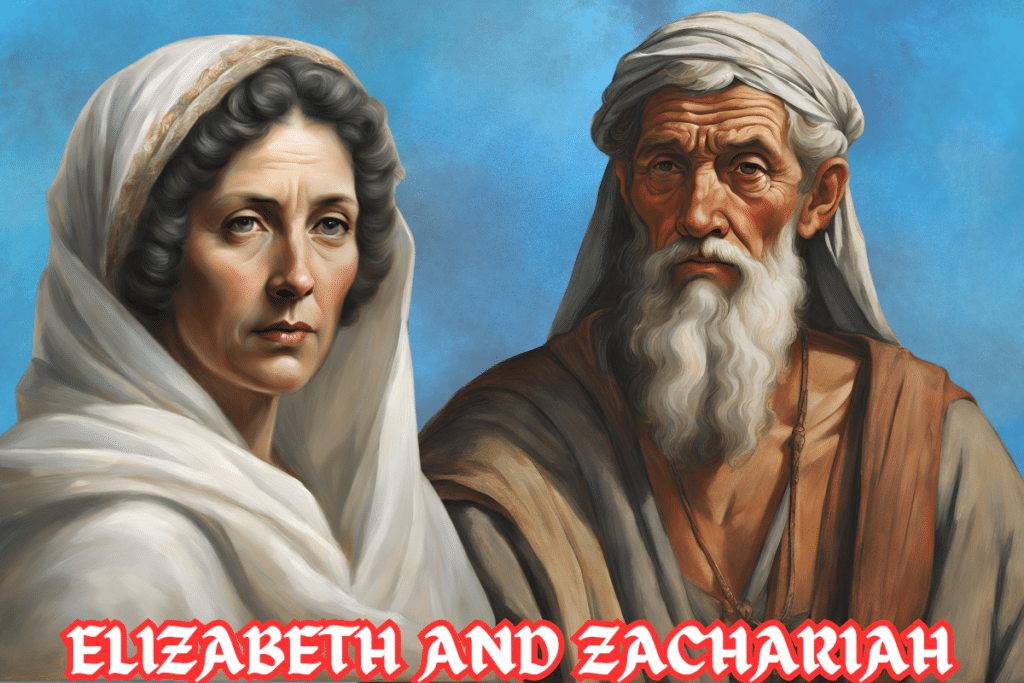
This personal trial was compounded by their advanced age, making the prospect of parenthood seem impossible. Yet, their unwavering faith ultimately led to a miraculous conception. Elizabeth’s eventual pregnancy not only fulfilled their long-held desire for a child but also marked the beginning of God’s redemptive plan through their son, John the Baptist.
Her Role in the New Testament
Elizabeth plays a pivotal role in the New Testament as the mother of John the Baptist, who is recognized as the forerunner of Jesus Christ. Her miraculous conception, despite being past childbearing age, highlights God’s intervention in the salvation narrative.
Elizabeth’s encounter with Mary, where she acknowledges the significance of Mary’s child, reinforces her importance in Christian history (Luke 1:42-45). Through her unwavering faith and obedience, Elizabeth exemplifies the fulfillment of God’s promises, setting the stage for John’s future ministry, which prepares the way for Jesus, thus intertwining their destinies in the divine plan of salvation.
Elizabeth’s Faith and Righteousness
Living a Life of Faithfulness
Elizabeth’s life exemplifies unwavering faithfulness to God despite significant personal challenges, including advanced age and the societal stigma of barrenness. Described as righteous and blameless (Luke 1:6), she remained devoted to God’s commandments throughout her life.
Her steadfast trust in God’s goodness, even during years of waiting for a child, illustrates that faith is not contingent on circumstances but rooted in a deep relationship with God. Ultimately, her miraculous conception of John the Baptist serves as a powerful testament to God’s faithfulness and the fulfillment of His promises, inspiring believers to maintain faith amid trials.
Obedience to God’s Commandments
Elizabeth’s life exemplifies obedience to God’s commandments, as she and her husband Zechariah are described as “righteous before God, living blamelessly according to all the commandments and regulations of the Lord” (Luke 1:6). Despite facing the societal stigma of childlessness, she remained faithful and devoted, demonstrating that true righteousness is rooted in a steadfast commitment to God’s will, regardless of personal challenges.
Elizabeth’s unwavering faith and adherence to God’s expectations serve as a powerful reminder that obedience is not contingent on circumstances but is a reflection of one’s trust in God’s promises and goodness.
Elizabeth’s Patience in Barrenness
Elizabeth’s barrenness, a source of deep personal anguish in a society that prized fertility, was a defining aspect of her life. Despite the societal stigma and emotional turmoil, she remained steadfast in her faith, trusting in God’s timing and plan.
Her unwavering patience was ultimately rewarded with the miraculous birth of John the Baptist, who would become the forerunner of Jesus Christ. Elizabeth’s story serves as a powerful testament to the transformative power of faith and the fulfillment of God’s promises, even in the face of seemingly insurmountable challenges.
The Miraculous Conception of John the Baptist
The Angel Gabriel’s Announcement
The turning point in Elizabeth’s life occurred when the angel Gabriel visited her husband, Zechariah, during his service in the Temple. Gabriel announced that despite their advanced age, Elizabeth would bear a son named John, who would be great in the sight of the Lord (Luke 1:13-15).

This divine proclamation marked the beginning of a new chapter for Elizabeth, filled with purpose and hope. The announcement not only fulfilled her long-held desire for a child but also positioned her son as a key figure in God’s redemptive plan, preparing the way for Jesus Christ.
Zechariah’s Initial Doubt
Upon hearing Gabriel’s message, Zechariah expressed doubt, questioning how such a miracle could occur given their old age (Luke 1:18). As a result, he was struck mute until the prophecy was fulfilled, serving as a sign of God’s power. In contrast, Elizabeth embraced the news with faith, filled with joy and anticipation for the child she would bear.
Her response highlights a profound trust in God’s promises, contrasting with Zechariah’s initial skepticism. Elizabeth’s faith and acceptance of God’s plan underscore her pivotal role in the unfolding salvation narrative, as she prepared to welcome John the Baptist into the world.
Elizabeth’s Joy and Faith in God’s Promise
Elizabeth’s response to her pregnancy was one of profound joy and faith, recognizing it as a miraculous blessing from God. She understood that this child, John the Baptist, was not only a fulfillment of her personal longing but also a significant part of God’s larger plan for salvation.
Filled with the Holy Spirit, Elizabeth expressed her joy when Mary visited, proclaiming, “Blessed are you among women” (Luke 1:42). Her celebration reflected her deep gratitude for God’s promises being realized, highlighting her role in the unfolding narrative of redemption and the anticipation of the coming Messiah.
Elizabeth’s Relationship with Mary, Mother of Jesus
The Visitation: A Meeting of Two Blessed Women
The visitation of Mary to Elizabeth is a pivotal moment in their intertwined stories. When Mary, miraculously pregnant with Jesus, learned of Elizabeth’s own miraculous conception of John the Baptist, she hurried to visit her cousin (Luke 1:39-40). This meeting of the two blessed women, both carrying sons who would play pivotal roles in God’s redemptive plan, is filled with spiritual significance.

Elizabeth, filled with the Holy Spirit, recognized the presence of the Messiah and blessed Mary (Luke 1:41-45). Mary responded with the Magnificat, praising God’s mercy and faithfulness (Luke 1:46-55). Their joyful encounter symbolizes the unity of God’s plan across generations and the power of faith to transcend human limitations.
The Baby Leaps in Elizabeth’s Womb
When Mary greeted Elizabeth, the baby in Elizabeth’s womb – John the Baptist – leaped, a profound moment signifying the presence of the Holy Spirit (Luke 1:41). Elizabeth, filled with the Holy Spirit, recognized the divine nature of Mary’s pregnancy with Jesus.
This miraculous encounter was more than just a physical reaction; it was a prophetic sign, as Elizabeth proclaimed Mary blessed among women and blessed was the fruit of her womb (Luke 1:42). The leaping of the baby and Elizabeth’s Spirit-filled response affirmed the significance of the two unborn children – John the Baptist, the forerunner, and Jesus, the Messiah – and their mothers’ unique roles in God’s redemptive plan.
Elizabeth’s Prophetic Blessing of Mary
Elizabeth’s greeting to Mary, “Blessed are you among women, and blessed is the fruit of your womb!” (Luke 1:42), is a profound acknowledgment of Mary’s unique role as the mother of the Lord. Filled with the Holy Spirit, Elizabeth expressed deep humility, recognizing the significance of Mary’s visit and the divine nature of her pregnancy.
This moment highlights Elizabeth’s faith and prophetic insight, as she understood that she was in the presence of the Messiah. Her blessing not only honors Mary but also emphasizes the fulfillment of God’s promises, celebrating the extraordinary roles both women play in God’s redemptive plan.
The Birth of John the Baptist
Elizabeth’s Role in Naming Her Son
When Elizabeth gave birth to her son, a debate arose among relatives and neighbors regarding his name, with many suggesting he should be named after his father, Zechariah. However, Elizabeth firmly insisted that his name be John, in obedience to the angel’s command (Luke 1:60).
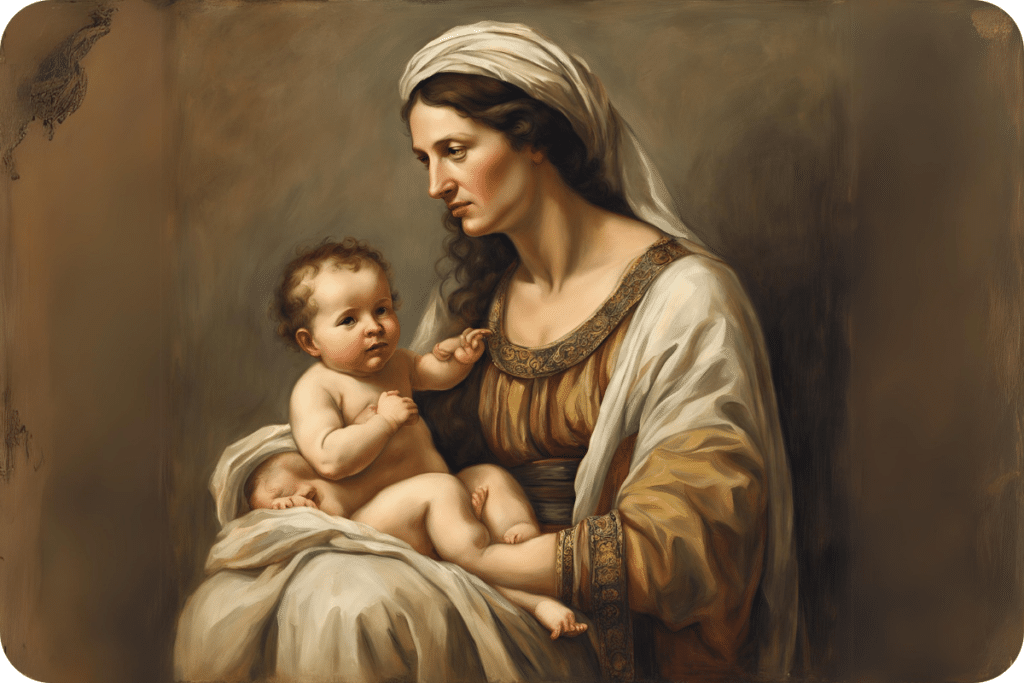
Her determination to follow God’s directive demonstrated her faith and courage, as she stood against societal expectations. When they turned to Zechariah for confirmation, he supported Elizabeth’s choice by writing, “His name is John,” which led to his immediate restoration of speech and a prophetic declaration of John’s future role (Luke 1:63-64).
The Significance of the Name “John”
The name “John,” meaning “God is gracious,” reflects the miraculous nature of his birth and the divine favor bestowed upon Elizabeth and Zechariah. This name was specifically chosen by God, signifying John’s future role as the forerunner of Jesus Christ, preparing the way for the Messiah.
His birth not only fulfilled the angel Gabriel’s prophecy but also embodied God’s grace and mercy towards His people, highlighting the significance of divine intervention in salvation history. John’s name serves as a reminder of God’s graciousness and the pivotal role he would play in the unfolding narrative of redemption.
The Reaction of Neighbors and Family
The birth of John the Baptist sparked considerable excitement among Elizabeth’s neighbors and family, who were astonished by both the miraculous circumstances and Elizabeth’s insistence on naming him John, contrary to tradition (Luke 1:57-61). This name choice signified divine obedience, as it was commanded by the angel Gabriel.
The situation intensified when Zechariah, previously rendered mute for doubting the angel’s message, confirmed the name in writing. His declaration, “His name is John,” not only restored his speech but also underscored the divine intervention in their lives, further affirming John’s significant role in God’s plan of salvation (Luke 1:63-64).
Elizabeth’s Legacy in Christian Tradition
The Role of John the Baptist as the Forerunner of Christ
John the Baptist, as the forerunner of Christ, plays a crucial role in the Christian faith, heralding the arrival of the Messiah. His proclamation, “Repent, for the kingdom of heaven is near” (Matthew 3:2), set the stage for Jesus’ ministry. Elizabeth’s role as his mother directly connects her to the foundation of the Gospel message, as her faith and obedience facilitated John’s miraculous birth.
This divine connection emphasizes the significance of her lineage and the fulfillment of God’s promises, highlighting how both Elizabeth and John were integral to the unfolding narrative of salvation in Christian theology.
Elizabeth as a Model of Faith and Obedience
Elizabeth is revered throughout Christian history as a model of faith and obedience. Her life exemplifies unwavering trust in God’s promises, even amidst seemingly impossible circumstances, such as her barrenness and advanced age. Elizabeth’s steadfastness serves as an encouragement for believers to remain patient and faithful, trusting that God’s timing is perfect.
Her story illustrates that true faith involves waiting on the Lord, believing in His goodness, and embracing His plans, which ultimately leads to divine blessings. Elizabeth’s legacy inspires Christians to cultivate similar faithfulness in their own lives, reflecting God’s grace and mercy in their journeys.
Lessons from Elizabeth’s Life for Modern Believers
Elizabeth’s life offers timeless lessons for modern believers, highlighting virtues such as faith, obedience, and patience. Her unwavering trust in God’s promises, despite facing societal stigma and personal trials, serves as a powerful reminder of the importance of waiting on God.
In a culture that often prioritizes immediate results, Elizabeth’s story encourages believers to embrace patience, knowing that God’s timing is perfect. Her experiences illustrate that miracles can unfold when one remains steadfast in faith, inspiring believers to trust in God’s plan and timing, even in challenging circumstances, reinforcing the enduring power of faith and hope.
Lessons from Elizabeth in the Bible
Elizabeth, the mother of John the Baptist, offers many valuable lessons for believers through her life and faith as depicted in the Bible. Here are some of the key lessons we can learn from her story:
1. Trust in God’s Timing
One of the most significant lessons from Elizabeth’s life is the importance of trusting in God’s timing. Elizabeth and her husband, Zechariah, longed for a child for many years but remained childless until they were well advanced in age. Despite the delay, Elizabeth did not lose faith. Her story reminds us that God’s timing is perfect, even when it doesn’t align with our own expectations. We can learn to be patient and trust that God knows the right time to fulfill His promises in our lives.
2. Faithfulness in the Face of Disappointment
Elizabeth remained faithful to God despite the personal disappointment of being barren, which was considered a significant hardship in her culture. Her faithfulness, even in the face of unanswered prayers, teaches us to continue trusting and serving God, regardless of our circumstances. Elizabeth’s story encourages us to maintain our faith and dedication to God, even when life doesn’t go as we had hoped.
3. Obedience to God’s Will
Elizabeth’s obedience is evident when she insists on naming her son John, as instructed by the angel Gabriel, even though it went against the expectations of her family and community. This act of obedience demonstrates her commitment to following God’s will, even when it was difficult. From Elizabeth, we learn the importance of obeying God’s commands, even when they challenge societal norms or personal desires.
4. The Power of Encouragement
When Mary, the mother of Jesus, visited Elizabeth, Elizabeth greeted her with words of blessing and encouragement. Elizabeth recognized the work of God in Mary’s life and affirmed it. This moment shows us the power of offering encouragement to others, especially when they are going through significant life changes or challenges. Elizabeth’s example encourages us to be supportive and affirming to those around us, recognizing and celebrating God’s work in their lives.
5. Joy in God’s Blessings
Elizabeth’s joy at the news of her pregnancy, despite her advanced age, is a powerful reminder of the joy that comes from experiencing God’s blessings. Her story teaches us to embrace and celebrate the blessings God gives us, regardless of when they come. It also shows us that joy is an appropriate and natural response to God’s goodness.
6. Humility in God’s Plan
Elizabeth displayed humility when she acknowledged Mary’s special role as the mother of the Messiah. Although Elizabeth herself was experiencing a miraculous event, she recognized and honored the even greater work that God was doing through Mary. This teaches us to be humble and to celebrate others’ successes and blessings, understanding that we each have our unique roles in God’s plan.
7. Patience and Perseverance
Elizabeth’s long wait for a child and her continued faithfulness during that time exemplify the virtues of patience and perseverance. Her story encourages us to persevere in our faith and our commitments, even when answers seem delayed. Patience, as shown by Elizabeth, is a key aspect of living a faithful and fulfilled life.
8. The Importance of Spiritual Relationships
The relationship between Elizabeth and Mary highlights the importance of spiritual relationships. Their mutual support and encouragement during significant moments in their lives remind us of the value of having relationships with others who share our faith. Such relationships can provide strength, encouragement, and affirmation in our spiritual journeys.
9. Recognizing God’s Work in Everyday Life
Elizabeth’s life teaches us to be attentive to the ways God is at work in our everyday lives. She recognized the significance of her pregnancy and the pregnancy of Mary, understanding that God was fulfilling His promises. This awareness encourages us to look for and acknowledge God’s hand in the ordinary and extraordinary events of our lives.
10. Courage to Stand Firm in Faith
Elizabeth’s insistence on naming her son John, in obedience to God, shows her courage to stand firm in her faith, even when others around her questioned her decision. This lesson teaches us to have the courage to follow God’s guidance and make decisions based on our faith, even when it goes against societal expectations or pressures.
11. God’s Faithfulness
Elizabeth’s story is a testament to God’s faithfulness. Despite her advanced age and the long years of waiting, God fulfilled His promise to her and Zechariah. Her life reminds us that God is faithful and that He will fulfill His promises, even if it takes time. We can trust that God will keep His word and that His plans for us are good.
12. God’s Ability to Do the Impossible
Elizabeth’s miraculous conception of John the Baptist, despite being barren and elderly, is a powerful reminder that nothing is impossible for God. Her story encourages us to believe in God’s power to work miracles in our own lives and to trust that He can accomplish what seems impossible from a human perspective.
Elizabeth’s life is rich with lessons that encourage us to trust in God, live faithfully, and embrace the unique role we each have in God’s plan. Her example inspires believers to live with patience, humility, and a deep sense of joy in God’s goodness.
Characteristics of Elizabeth in the Bible
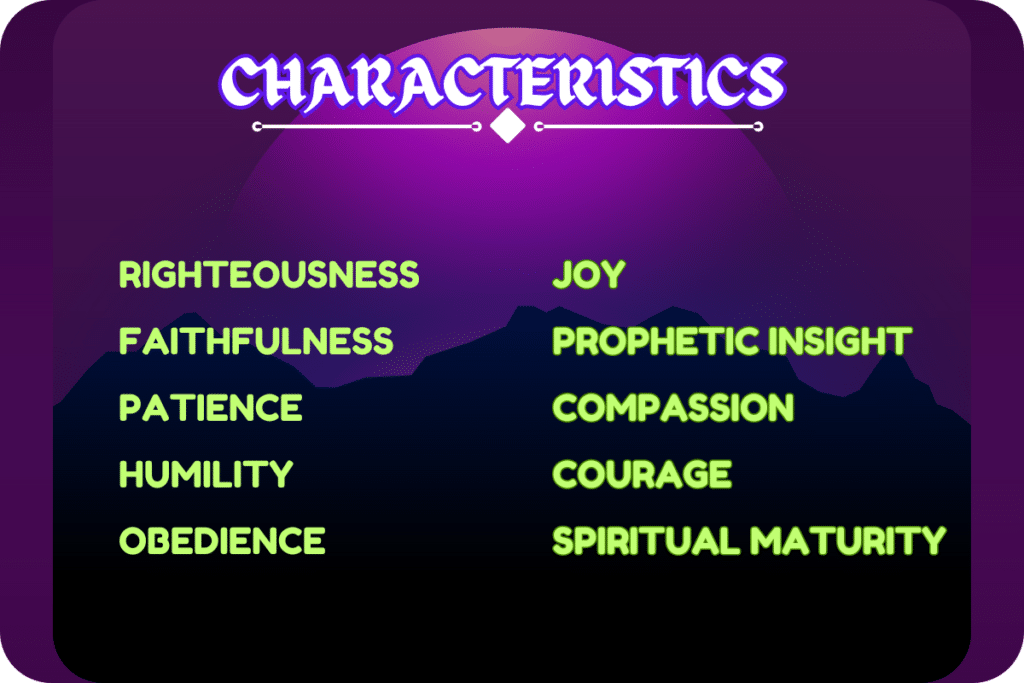
Elizabeth, the mother of John the Baptist, is a significant figure in the New Testament. Her life and character are highlighted by several key traits that reflect her deep faith and obedience to God. Here are some of the main characteristics of Elizabeth as depicted in the Bible:
1. Righteousness
Elizabeth is described as a righteous woman who lived according to God’s commandments. Luke 1:6 states that both Elizabeth and her husband Zechariah were “righteous before God, walking blamelessly in all the commandments and statutes of the Lord.” This indicates that she was devoted to living a life that was pleasing to God.
2. Faithfulness
Elizabeth’s faithfulness is a central aspect of her character. Despite the challenges she faced, particularly her long years of barrenness, she remained faithful to God. Her trust in God’s plan, even in the face of personal disappointment, is evident in her story.
3. Patience
One of the most remarkable characteristics of Elizabeth is her patience. She and Zechariah had been praying for a child for many years, yet they remained childless well into old age. Despite this, Elizabeth continued to wait on the Lord, demonstrating a deep patience and trust in God’s timing.
4. Humility
Elizabeth exhibited great humility, especially in her interactions with Mary, the mother of Jesus. When Mary visited her, Elizabeth acknowledged Mary’s blessed status and expressed a humble gratitude that the mother of her Lord would visit her. Her humility is further seen in her recognition of God’s work in her life.
5. Obedience
Elizabeth was obedient to God’s instructions. When it came time to name her son, she insisted on naming him John, as the angel Gabriel had instructed, even though it was unconventional and against the wishes of her relatives. Her obedience to God’s will was unwavering.
6. Joy
The Bible depicts Elizabeth as a woman filled with joy, especially after she conceived John the Baptist. Her joy was not just for her personal blessing but also for the greater work of God that was unfolding. Her joy is a reflection of her deep faith and recognition of God’s blessings.
7. Prophetic Insight
Elizabeth demonstrated prophetic insight, especially during her encounter with Mary. Filled with the Holy Spirit, she recognized the significance of Mary’s pregnancy and spoke blessings over Mary and her unborn child. This shows her spiritual sensitivity and connection with God.
8. Compassion
Elizabeth’s compassion is evident in her response to Mary’s visit. Understanding the extraordinary circumstances surrounding both of their pregnancies, Elizabeth offered support and encouragement to Mary, showing her compassionate nature.
9. Courage
Elizabeth showed courage, particularly in her decision to name her son John. Despite the cultural pressure to name him after his father, she courageously upheld God’s command. This decision was not just a simple act of naming but a declaration of her commitment to God’s will.
10. Spiritual Maturity
Elizabeth’s life reflects a deep spiritual maturity. She navigated the challenges of life, including barrenness and old age, with grace and wisdom. Her responses to God’s actions in her life reveal a profound understanding of His sovereignty and faithfulness.
Elizabeth’s character serves as an example of what it means to live a life of faith, trust, and obedience to God. Her story encourages believers to remain steadfast in their faith, regardless of the challenges they face, and to trust in God’s timing and plans.
Conclusion
Elizabeth’s story in the Bible serves as a powerful testament to God’s faithfulness and the importance of trusting in His promises. Despite her barrenness and advanced age, Elizabeth remained steadfast in her faith, exemplifying patience and obedience. Her miraculous pregnancy with John the Baptist marked a significant moment in God’s divine plan, symbolizing the joy of unexpected blessings.
The deep spiritual connection between Elizabeth and Mary highlights the continuity of God’s purpose across generations. Elizabeth’s legacy inspires believers to embrace faith, live in obedience, and trust in God’s perfect timing, reinforcing that divine miracles often unfold when least expected.
Reference
Unique FAQ’s
What Was Elizabeth’s Role in the Bible?
Elizabeth was the mother of John the Baptist, the forerunner of Jesus Christ. Her role in the Bible is significant as it highlights God’s ability to work miracles and fulfill His promises, even in seemingly impossible circumstances.
How Was Elizabeth Related to Mary, Mother of Jesus?
Elizabeth was a relative of Mary, often referred to as her cousin. Their close relationship is evident in the story of the Visitation, where Mary visits Elizabeth after learning of her own miraculous pregnancy.
What Can We Learn from Elizabeth’s Story?
Elizabeth’s story teaches us about the importance of faith, patience, and obedience to God. Her life exemplifies the rewards of trusting in God’s promises, even when faced with challenges or delays.
Why Was the Birth of John the Baptist So Significant?
The birth of John the Baptist was significant because he was the one chosen to prepare the way for Jesus Christ. His role as a prophet and forerunner was essential in the unfolding of the Gospel message.
How Is Elizabeth Remembered in Christian Tradition?
Elizabeth is remembered as a model of faith and righteousness. Her story is celebrated in Christian tradition, particularly in the context of the Visitation and the birth of John the Baptist. She is seen as a woman of great faith who played a crucial role in God’s plan of salvation.

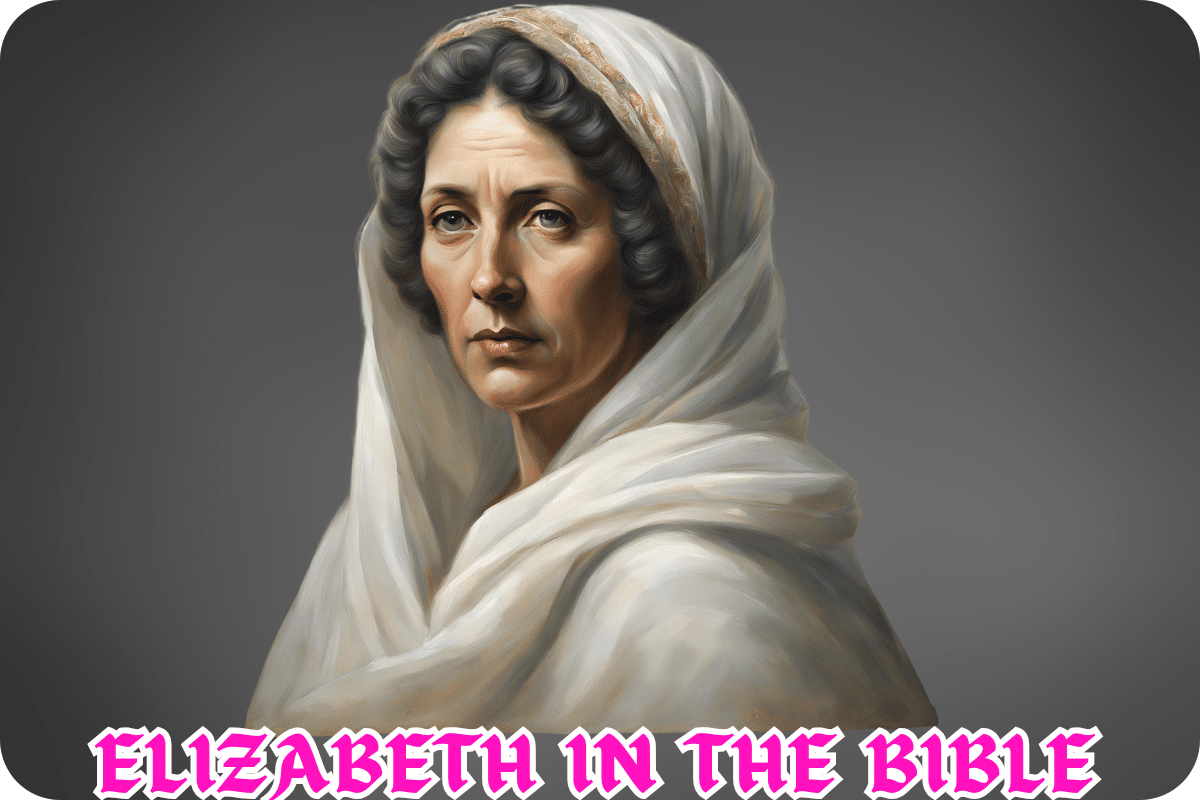
1 thought on “2. EMPOWER ELIZABETH IN THE BIBLE”